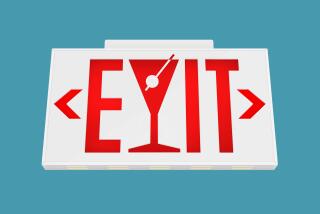âDrunkorexiaâ is a behavior that doesnât work, health experts say
What do you drink when youâre trying to shed pounds? Iced tea? Diet soda? What about alcohol?
One cardinal rule of losing weight is limiting alcohol consumption, but can âcarefulâ dieters spike their punch with a little booze and still stand on the bathroom scale with confidence? Can they âoutsmartâ calories by âtradingâ them â skipping lunch to enjoy a few beers at the Dodgers game?
The short answer is no. All calories are not created equal. And drinkers who skip meals are quicker to become inebriated, with all the assorted consequences. Nonetheless, experts say the behavior is common.
College-age women and men know this trick all too well. They want to stay slim but feel drawn to pub crawls or frat parties. âMany cocktails popular with young women, such as margaritas, have lots of calories,â says Dr. David Heber, director of the UCLA Center for Human Nutrition and professor of medicine at the UCLA Geffen School of Medicine. In order to drink, he adds, some women will skip food and âget their calorie allowance in alcoholic drink.â
The acceptance of excessive drinking on college campuses, combined with an obsession with thinness, may be to blame for a type of drinking and dieting behavior casually referred to as âdrunkorexia,â a condition in which people eat very few calories, if any, during the day and then drink â or even binge drink â later. (Afterward, some people spin out of control and binge on food too.)
Drunkorexia is associated with behaviors such as skipping meals, using laxatives and exercising to compensate for excess alcoholic calories, according to Adam E. Barry, assistant professor at the University of Florida Department of Health Education and Behavior. In such cases, he refers to the âweight-consciousâ drinker as someone with âdisordered eating,â which is not the same as a clinical eating disorder such as anorexia or bulimia.
âI think there are different ways that it is exemplified between men and women,â adds Barry, who was the lead researcher on a study of drunkorexia published in the Journal of American College Health. âWomen skip meals due to drinking, while men tend to exercise in order to offset the calories from drinking.â
Until more research is available, the healthcare community can only make educated guesses about how to treat drunkorexia. Barry suspects it âpeaks in college,â but it certainly isnât limited to the college years. (Think of the slightly older target audience for Skinnygirl cocktails, which started with a âskinny margaritaâ from reality TV star Bethenny Frankel and turned into a company purchased in 2011 by Beam Inc.)
David Jernigan, director of the Center on Alcohol Marketing and Youth at Johns Hopkins Bloomberg School of Public Health, says that ads depicting alcohol often claim it as a healthful beverage, âfitness friendlyâ or âlow in calories.â (At skinnygirlcocktails.com, readers are told, âWeâve expanded our family to keep bringing you all of the cocktail options you want, without the extra calories you donât.â)
Beer, Jernigan adds, is âwell known as the calorie packer ⌠distilled spirits companies advertise their product as low calorie.â
When you consider the amount of money spent on aggressive advertising campaigns, itâs easy to see why women are drawn to drink â and the promise. Says Jernigan, âWe know from Nielsen data that in 2011, the alcohol industry spent $1.7 billion on alcohol advertising and marketing on all measured media, which includes TV, radio, Internet, magazines, newspapers and outdoor.â
Experts say drunkorexia is a behavior associated with the need to escape and relieve painful emotions, stress and anxiety, says Susan Albers, a psychologist and author of five books about mindful eating, including â50 Ways to Soothe Yourself Without Food.â
âThe binge eating or drinking numbs or turns off that feeling, so they arenât feeling it in that moment,â Albers says. âThe difficulty is when they are done eating or restricting food, or have consumed substances, those feelings come back.â At best, itâs a momentary comfort measure, she says.
Why alcohol and an empty stomach definitely donât mix
What happens when you drink alcohol on an empty stomach?
If you havenât eaten for several hours, the body could experience low blood sugar, characterized by hunger, headaches or feeling shaky.
âLow blood sugar from under-eating can cause cravingsâ for high-carb, sugary foods, says Kelley Morrow, assistant clinical director of the Eating Disorder Center of California.
âCravings for alcohol can also rise dramatically,â she adds. âThe brain instinctively knows alcohol will hit the bloodstream quickly and raise blood sugar.â
To avoid blood sugar fluctuations, eat meals throughout the day.
âEating some protein and healthy carbohydrates such as fruits and vegetables and whole grains can keep the mind alert and able to maintain abstinence from alcohol,â says UCLAâs Dr. David Heber.






